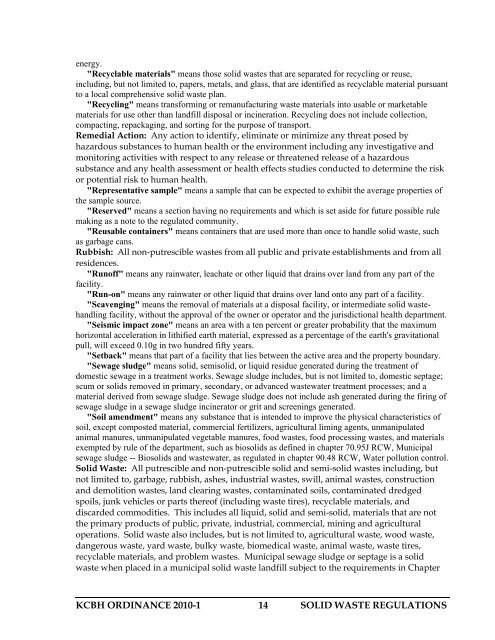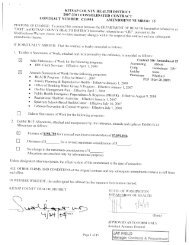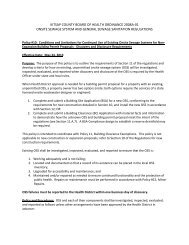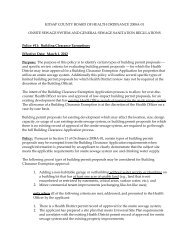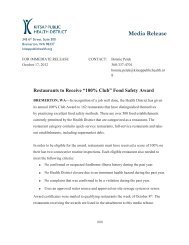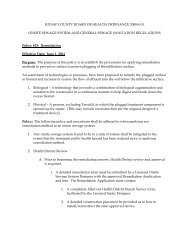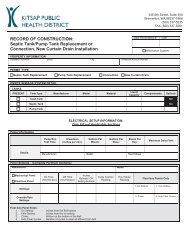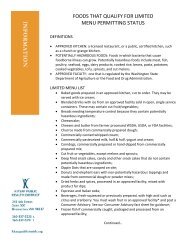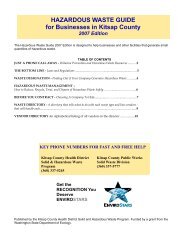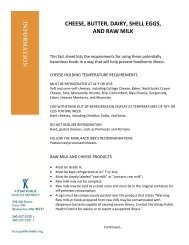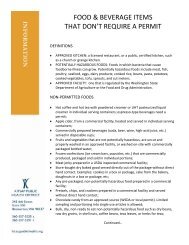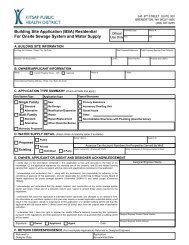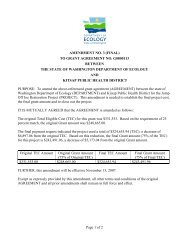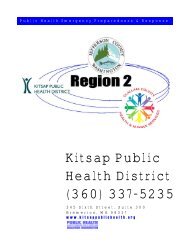SOLID WASTE REGULATIONS - Kitsap Public Health District
SOLID WASTE REGULATIONS - Kitsap Public Health District
SOLID WASTE REGULATIONS - Kitsap Public Health District
Create successful ePaper yourself
Turn your PDF publications into a flip-book with our unique Google optimized e-Paper software.
energy.<br />
"Recyclable materials" means those solid wastes that are separated for recycling or reuse,<br />
including, but not limited to, papers, metals, and glass, that are identified as recyclable material pursuant<br />
to a local comprehensive solid waste plan.<br />
"Recycling" means transforming or remanufacturing waste materials into usable or marketable<br />
materials for use other than landfill disposal or incineration. Recycling does not include collection,<br />
compacting, repackaging, and sorting for the purpose of transport.<br />
Remedial Action: Any action to identify, eliminate or minimize any threat posed by<br />
hazardous substances to human health or the environment including any investigative and<br />
monitoring activities with respect to any release or threatened release of a hazardous<br />
substance and any health assessment or health effects studies conducted to determine the risk<br />
or potential risk to human health.<br />
"Representative sample" means a sample that can be expected to exhibit the average properties of<br />
the sample source.<br />
"Reserved" means a section having no requirements and which is set aside for future possible rule<br />
making as a note to the regulated community.<br />
"Reusable containers" means containers that are used more than once to handle solid waste, such<br />
as garbage cans.<br />
Rubbish: All non-putrescible wastes from all public and private establishments and from all<br />
residences.<br />
"Runoff" means any rainwater, leachate or other liquid that drains over land from any part of the<br />
facility.<br />
"Run-on" means any rainwater or other liquid that drains over land onto any part of a facility.<br />
"Scavenging" means the removal of materials at a disposal facility, or intermediate solid wastehandling<br />
facility, without the approval of the owner or operator and the jurisdictional health department.<br />
"Seismic impact zone" means an area with a ten percent or greater probability that the maximum<br />
horizontal acceleration in lithified earth material, expressed as a percentage of the earth's gravitational<br />
pull, will exceed 0.10g in two hundred fifty years.<br />
"Setback" means that part of a facility that lies between the active area and the property boundary.<br />
"Sewage sludge" means solid, semisolid, or liquid residue generated during the treatment of<br />
domestic sewage in a treatment works. Sewage sludge includes, but is not limited to, domestic septage;<br />
scum or solids removed in primary, secondary, or advanced wastewater treatment processes; and a<br />
material derived from sewage sludge. Sewage sludge does not include ash generated during the firing of<br />
sewage sludge in a sewage sludge incinerator or grit and screenings generated.<br />
"Soil amendment" means any substance that is intended to improve the physical characteristics of<br />
soil, except composted material, commercial fertilizers, agricultural liming agents, unmanipulated<br />
animal manures, unmanipulated vegetable manures, food wastes, food processing wastes, and materials<br />
exempted by rule of the department, such as biosolids as defined in chapter 70.95J RCW, Municipal<br />
sewage sludge -- Biosolids and wastewater, as regulated in chapter 90.48 RCW, Water pollution control.<br />
Solid Waste: All putrescible and non-putrescible solid and semi-solid wastes including, but<br />
not limited to, garbage, rubbish, ashes, industrial wastes, swill, animal wastes, construction<br />
and demolition wastes, land clearing wastes, contaminated soils, contaminated dredged<br />
spoils, junk vehicles or parts thereof (including waste tires), recyclable materials, and<br />
discarded commodities. This includes all liquid, solid and semi-solid, materials that are not<br />
the primary products of public, private, industrial, commercial, mining and agricultural<br />
operations. Solid waste also includes, but is not limited to, agricultural waste, wood waste,<br />
dangerous waste, yard waste, bulky waste, biomedical waste, animal waste, waste tires,<br />
recyclable materials, and problem wastes. Municipal sewage sludge or septage is a solid<br />
waste when placed in a municipal solid waste landfill subject to the requirements in Chapter<br />
KCBH ORDINANCE 2010-1 14 <strong>SOLID</strong> <strong>WASTE</strong> <strong>REGULATIONS</strong>


